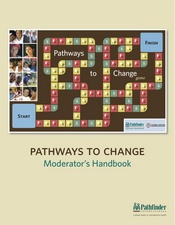Pathways to Change game (Multiple Languages)
Low-literacy version of Pathfinder International’s Pathways to Change game
Low-literacy version of Pathfinder International’s Pathways to Change game
 The Pathways to Change game is designed to make the concept of behavior change more understandable. When outreach workers use the game with their communities, it stimulates thinking that can motivate individuals and communities to change. Playing Pathways to Change can also help community health workers and peer educators understand the target population’s perceptions of barriers to change and facilitators of change. When the game is used in this way, it functions as an informal data collection tool that can be helpful for designing and tailoring interventions.
The Pathways to Change game is designed to make the concept of behavior change more understandable. When outreach workers use the game with their communities, it stimulates thinking that can motivate individuals and communities to change. Playing Pathways to Change can also help community health workers and peer educators understand the target population’s perceptions of barriers to change and facilitators of change. When the game is used in this way, it functions as an informal data collection tool that can be helpful for designing and tailoring interventions.
This low-literacy version of the game uses simple symbols to represent the factors at the personal, social, and environmental levels that make it harder or easier for someone to make a change in behavior. A second version of the game, designed primarily for use in Uganda, has a glossary of key terms with translations in Acholi, Lango, Iteso, Lukonzo, Luganda, and Swahili. The Moderator’s Handbook (also available in French) is a helpful resource for training outreach workers.
Pathway to Change Game (Multiple Languages)
Year of Publication: 2014
Languages: English, French
This site was originally developed by the Health Communication Capacity Collaborative (Cooperative Agreement #AID-OAA-A-12-00058) and expanded under Breakthrough ACTION (Cooperative Agreement #AID-OAA-A-17-00017) both under the leadership of Johns Hopkins Center for Communication Programs (CCP). This website is now maintained by CCP and its contents are the sole responsibility of CCP. The contents of this website do not necessarily reflect the views of USAID, the United States Government, or Johns Hopkins University.
